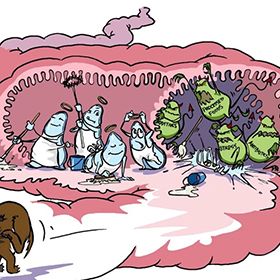
Research into the gut microbiome has ramped up over the past decade thanks to high investments over 100 million dollars by the US Governments in the Human Microbiome Project in 2007 as well as large sums from companies and private sources not wanting to be left behind as its importance for our health has become more widely recognised and understood by the mainstream. There is now a tsunami wave of information coming through on the gut microbiome, literally thousands of new studies and increasing each year.
Until recently the positive effects of the gut microbiome on our digestive system and health has been severely under rated. Wisdom of Chinese doctors from centuries ago, who somehow knew that the intestines were not merely a digestive organ, but the centre of health and well being. Hippocrates was recoded as saying that all illness begins in the gut. Throughout history from the Egyptians till around 80 years ago medicine and the bowels were frequently mentioned in the same sentence.
Even today the nomadic Maasai tribes in Africa attribute most illnesses to the effect of “pollutants” that block or inhibit digestion. In these communities the plants are used to cure diseases served mainly as strong purgatives and emetics; they “cleanse” the body and digestive system from polluting substances.[1] While studies of the great apes show they self-medication to control intestinal parasite infections and gut problems across Africa.[2] Chimpanzees (Pan troglodytes) for example, swallow the leaves of certain plant species whole, without chewing to aid expulsion of certain parasites. Swallowing rough or bristly leaves increases gut motility causing expulsion of adult worms, which disrupts the nematode’s life cycle and likely reduces worm burdens.[3] Even carnivores first eat the guts of their kill and get all the intestinal bacteria. We seem to be the only ones who have forgotten the importance of the gut.
We now know the gut is the cornerstone of health and inflammation in the body. The first theory to explain the link between the gut and inflammation, which underlies all the chronic diseases we suffer from, was put forward in 1907, when Elie Metchnikoff proposed that tissue destruction (disease) and senescence (ageing) throughout the body were consequences of chronic systemic inflammation, which occurred as a result of increased permeability in the colon and the escape of bacteria and their products into the blood. He believed that these bacterial products activated our immune response (macrophages) and that the resulting inflammatory response caused deterioration of surrounding tissues and that this macrophage “intoxification” had systemic effects and led to deterioration of even distant tissues. And he was right.
[1] Bussmann et al., 2006.
[2] MCLennan and Huffman, 2012.
[3] Huffman and Caton, 2001.